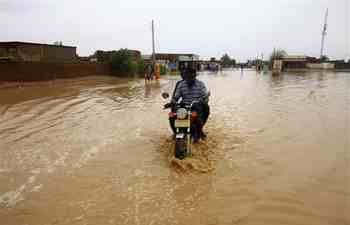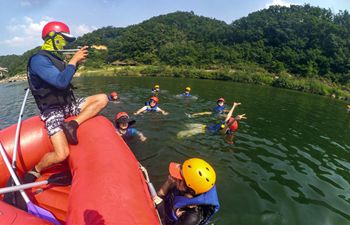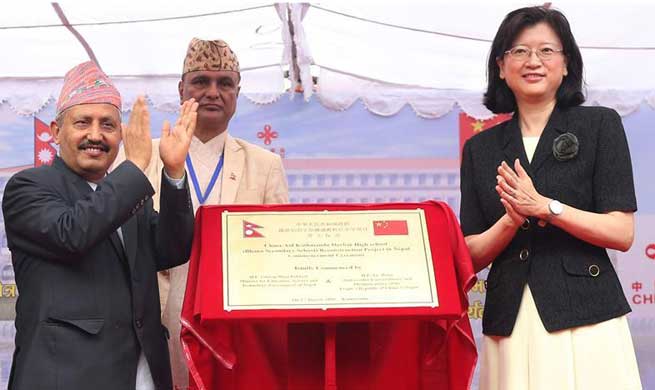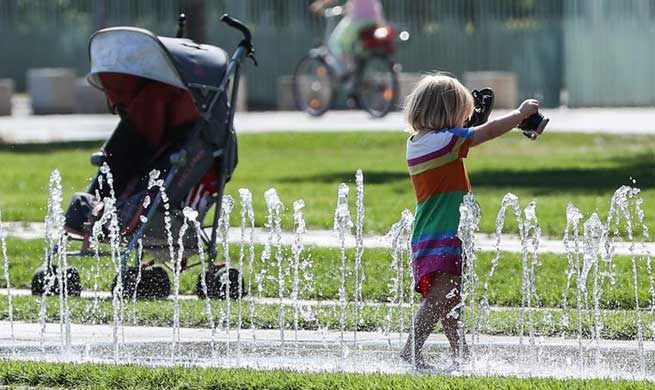ADDIS ABABA, Aug. 4 (Xinhua) -- The Africa Center for Disease Control and Prevention (Africa CDC) on Saturday stressed the need to establish comprehensive and well-coordinated response strategy to eradicate the new Ebola outbreak in the Democratic Republic of Congo (DRC).
The Africa CDC - a special organ of the African Union (AU) established to support African countries to improve surveillance, emergency response, and prevention of infectious diseases - made the call as the Central African nation revealed a new Ebola virus outbreak this week.
The DRC on Wednesday declared a new outbreak of the Ebola virus disease in two of its provinces - 32 cases in North Kivu province and one additional case in Ituri province.
On July 28, the North Kivu Provincial Health Division notified the Ministry of Health of DRC regarding suspected Ebola cases which were subsequently confirmed by laboratory testing.
According to the Africa CDC, the latest outbreak - the tenth outbreak of Ebola in the DRC - came shortly after the ninth outbreak was declared over on July 24 in DRC's Equateur province.
A total of 33 cases, including 26 deaths, were reported with a cases fatality ratio of about 79 percent as of August 1, according to the Africa CDC.
North Kivu, the most affected province, is located about 2,500 kilometers from the Equateur province where the just ended outbreak was located.
The fact that North Kivu is one of the most densely populated provinces in DRC, with a population of about 8 million inhabitants, is also said to be another concern in effectively controlling the new Ebola outbreak.
Another concern is also said to be North Kivu's proximity to neighboring countries, as Uganda and Rwanda bordered the province.
Beni and surrounding areas, with a population of about 2 million inhabitants, is also said to be the epicentre of the outbreak, according to the Africa CDC's latest statement.
Noting the need to build capabilities to effectively respond and control the new Ebola outbreak, the Africa CDC urged the "need to support the leadership role of the Government of DRC to establish a comprehensive and well-coordinated response strategy."
It also stressed the need to operate in partnership and synergy to "control this outbreak and mitigate the impact on the health and economic security of the African Continent."
The AU - through the Africa CDC - also revealed that it "will continue to support the efforts of the DRC Government during this outbreak as well as neighboring countries."
The AU further indicated that it is presently responding to the outbreak with appropriate measures to support the government-led response, which include monitoring of the situation through its Emergency Operation Centres, and coordinating with the Ministry of Health of the DRC and the World Health Organization (WHO).
The pan African bloc, AU, further revealed that it is currently mobilizing and preparing to relocate its Emergency Response Team to the current affected areas as well as supporting laboratory diagnostic capacity through the provision of laboratory supplies for testing of the Ebola virus.
According to the AU, activating the AU emergency support mechanism through different units of the commission including the Peace Support Operation Division is also another area of intervention.
The Africa CDC also stressed that it is sensitizing member states through its information sharing platforms to heighten their surveillance and preparedness efforts through its Regional Collaborating Centres in the Eastern and Central Africa.
DRC's Health Minister, Oly Ilunga, on Wednesday said that since Ebola is endemic in many parts of the country due to the equatorial forest ecosystem, the Ministry of Health has already strengthened its epidemiological surveillance system in all risk areas, including North-Kivu.
WHO Director-General, Tedros Adhanom Ghebreyesus, while announcing the end of the ninth Ebola outbreak in DRC last week, also urged the DRC government and the international community to build on the positive momentum generated by the quick containment of the outbreak.
"This effective response to Ebola should make the government and partners confident that other major outbreaks affecting the country, such as cholera and polio, can also be tackled," he said.
"We must continue to work together, investing in strengthened preparedness and access to healthcare for the most vulnerable," he added.













